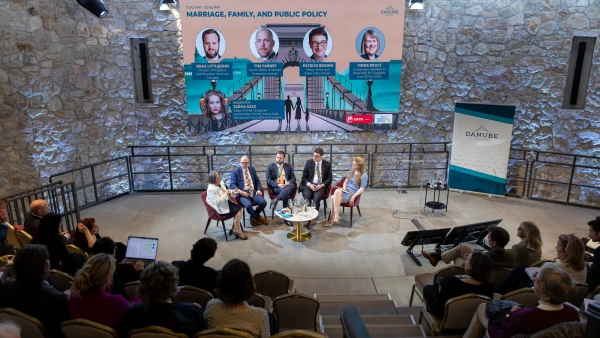Budapest, Hungary, Apr 9, 2025 /
13:49 pm
As birth rates fall, loneliness rises, and the fabric of social life frays across much of the Western world, the question of how to support family formation has become a political, cultural, and even civilizational challenge.
At the “Family Formation and the Future” conference hosted by the Danube Institute in Budapest, Hungary, April 1-2, experts from the U.S. and Europe explored the complex, intertwined causes behind this unprecedented crisis in the West and proposed ambitious steps to restore marriage as the backbone of society.
The message contained in the panel titled “Marriage, Family, and Public Policy” was clear: Without strong families, societies weaken — and no amount of economic growth or technological progress can compensate for that loss.
The country that hosted these discussions, Hungary, often served as a case study for the participants. With its bold pro-family policies, it has become something of a laboratory — one that other Western nations are increasingly looking to for inspiration. While the country hasn’t reversed all the global trends, its targeted efforts to make marriage and child-rearing more viable have sparked international attention.
Despite their different emphases, the panelists all converged on the idea that the family crisis is real, multifaceted, and politically unavoidable — and that reviving the family is not merely a private concern but a public imperative.
The cost of family breakdown
Fiona Bruce, a former member of Parliament who spent over a decade in the British Parliament advocating for family-friendly policies, opened the session with a stark diagnosis: Nearly half of all U.K. children experience family instability by the age of 5, leading to widespread mental health issues and a surge in state care placements.
Bruce recounted her long campaign for “family hubs” to support parents and communities, lamenting that despite her efforts, the U.K. remains one of the countries with the highest rates of family breakdown and fatherlessness. Her contribution served as a powerful reminder that family decline is no longer theoretical — it’s playing out in real time, with measurable consequences for the next generation.
Pornography and the collapse of family culture
While Bruce exposed the scale of the problem in her own country, Brad Littlejohn, director of programs and education for American Compass, zeroed in on one of its most corrosive drivers: pornography. He argued that the cultural foundations of family life are under attack and that economic support alone can’t mend what moral collapse has broken.
“Conservatives cannot afford to ignore the scourge of pornography,” Littlejohn declared, recalling that opposition to public vice was once central to the conservative movement. “Today’s porn makes the Playboy centerfolds of yesteryear look like child’s play … featuring every kind of degradation one can imagine and many that one cannot, from incest and bestiality to gang rape scenes.”
Citing research that places the average age of first exposure at 11, with some children addicted by age 8 or 9, Littlejohn argued that this content is more than a personal vice — it is an existential threat to civilization.
“Pornography destroys marriages and it keeps marriages from forming in the first place,” he said. “Even more fundamentally … it has warped the very foundations of family life by dissolving the boundary of childhood and adulthood.”
Despite decades of legal setbacks, he noted, momentum is shifting: 21 American states have passed age-verification laws, and an upcoming Supreme Court case may finally impose real restrictions on the porn industry. For Littlejohn, cultural renewal must start with protecting children and reclaiming moral ground long ceded.

Rebalancing the equation: culture and economy
(Story continues below)
Subscribe to our daily newsletter
Patrick Brown, a fellow at the Ethics and Public Policy Center in Washington, D.C., offered a complementary analysis, claiming that while culture is in fact decisive, economics still matters and badly-designed policy makes things worse. He outlined a pragmatic yet ambitious family agenda rooted in both economic support and cultural transformation.
“Society relies on the contributions of parents,” Brown noted. “Parents are bearing the cost of raising kids individually, but the benefits flow to the rest of society.” He emphasized that family policy should not be seen as niche or sentimental but as a form of social infrastructure, no less essential than roads or schools.
Brown called for expanding the child tax credit, lowering the cost of living, and addressing the “marriage penalty” in U.S. welfare programs, which discourages low-income couples from marrying. But he also acknowledged that policy alone will not be efficient without a deeper cultural shift. In the U.S., he said, marriage is often treated as a capstone, a reward for career success, rather than a foundation for adulthood.
In this respect, he regards Hungary as an interesting model. He highlighted that unlike most of the West, the country has successfully reversed out-of-wedlock birth trends, encouraging marriage and childbearing through deliberate policies.
“That is a tremendous success story,” Brown told the Budapest audience. “You should all be very proud of that. Americans should examine it, study from it, and learn what benefits can be contingent on marriage.”
Civilizational sadness and the loss of norms
While Brown focused on incentives, Tim Carney, senior fellow at American Enterprise Institute, delved into more existential questions behind declining birth and marriage rates. In the U.S., he explained, the economy has improved since the 2008 crash, yet birth rates continue to plummet, evidence that financial hardship alone cannot explain the collapse in family formation.
Carney argued that the real crisis lies in what he called “civilizational sadness” — a deep, philosophical shift in how people see themselves and others.
“What we call expressive individualism is in fact an anthropology,” he explained, “a belief that as autonomous individuals, our job is to fully realize ourselves and that any connection with other people should be conditional and transactional.”
This worldview, he warned, is not only alienating but also fosters hostility to marriage and parenthood.
“When you ask young people [why they won’t have children], they don’t mention money anymore, or the fact that they’re ‘selfish,’ but claim instead that ‘it would destroy the climate,’” Carney said. “I think that talk about the environment is more of a cover story.”
Even the way cities and transport are structured, he added, discourages family life. In a witty aside, he referred to “car seats as contraception,” citing studies that show how practical obstacles — like needing a bigger vehicle for a third child — discourage parents from expanding their families.
From diagnosis to direction
Beyond the different perspectives, the speakers displayed a shared sense of urgency. They all converged on the fact that the modern West is not naturally conducive to family life, and without concerted political and social effort, its decline will continue.
The parallel between Hungary and the United States served as a subtle but significant thread. For these experts, while Hungary’s family policy reforms have not yet solved the complex problem of demographic decline, their visible impact on marriage and fertility rates offers a counterpoint to the fatalism that often pervades Western debates.
American decision-makers could learn from them, if not replicate them, they said, and then at least draw inspiration from them.


















